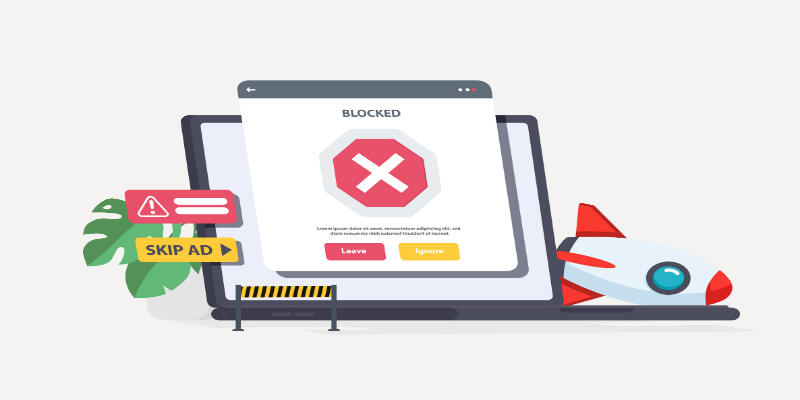Disclaimer: This post may contain affiliate links, meaning we get a small commission if you make a purchase through our links, at no cost to you. For more information, please visit our Disclaimer Page.
For over a decade now, the internet has been a subject of debate. Stakeholders have spent plenty of their time trying to compare its benefits and the harm it causes.
Research has it that workplaces are among the most affected areas, where misuse of the internet results in massive time wastage and reduced productivity. So, is it possible to stop employees from accessing certain websites?
By using website blockers, such as explorer extensions and apps, you can stop employees from accessing certain websites. Although using website blockers to restrict access to unwanted sites may not limit time wastage, it allows businesses to make significant strides towards enhancing productivity.
Another crucial aspect worth consideration is how to keep track of what the employees are doing over the internet. With a typical proxy operation, you can track internet use to a specific employee. This post will focus on some of the common ways to help stop employees from accessing certain websites.
Table of Contents
How Do I Stop Employees From Accessing Certain Websites?
Be Transparent With Your Staff
Ensure that you inform your staff of your intentions before restricting access to any website. You should explain the type of websites that are out of bound and why you are restricting them.
Your employees will appreciate this move, thus preventing more time wasted consulting IT experts whenever they encounter challenges accessing blocked sites.
Also, various reports suggest that including an internet use policy in the employee’s contract can help them understand websites they shouldn’t visit. Such a policy should feature protocols for accessing blocked websites that may require legitimate access.
Moreover, you ought to include a disclaimer warning against the attempted desecration of the policy and notice that you are monitoring such site’s activities.
Use Of Browser Extensions
A much seamless way of restricting access to websites on web browsers is using the browser’s add-on BlockSite. The add-on allows you to bar access to certain websites, including Facebook, adult sites, and URLs that feature certain keywords.
You can use the Block site in Mozilla Firefox or Google Chrome even when logged in incognito mode.
However, if you think your employees can bypass the BlockSite settings to manage blocked sites, you still have an option to set up a password or pin to limit access.
Incorporate Use Of Employee Monitoring Software
If you are looking for a more effective solution, consider using software that monitors all employees’ actions in the workplace. Such software can track each of your employee’s steps and whether they are active.
Moreover, top-notch employee monitoring software also features content-filtering aspects that allow you to control certain websites and topics that are not suitable to the work environment.
Similarly, you can also single out off-limits websites by adding them to your list of verboten websites. Finally, you can trigger alerts and notifications that pop up when any staff tries to access restricted content.
Can You Control Employees’ Personal Internet Use At Work?
Have A Computer Use Policy
Any organization that gives its employees unlimited access to computers requires a computer use policy. With a computer use policy, companies can communicate their rules and expectations to employees regarding the personal use of the internet.
With a computer use policy, you can:
Outline best practices and security standards such as web browsing prospects, lockout policies, and password management practices
Outline corrective actions precedent for employees who do not use workplace technology as required.
Equip The Staff With Training On Cybersecurity Awareness
This tip should be applied regardless of whether employees use workplace devices for personal reasons. It is essential to take all employees interacting with the company’s technology through critical cybersecurity training.
Equipping your staff with security awareness training is essential since it reduces the chances of employees engaging in high-risk behaviors or falling victim to phishing schemes that could ultimately affect the business at large.
Define How Much Personal Use Is Allowed
It would be best to inform your employees clearly on the level of personal activities that the company permits on its devices. Generally, the concept of “personal use” is used to define typical web surfing.
Stipulating your expectations in advance will enable your personnel to understand what you expect from them.
Here are some guidelines that you can use to define the activities you wish to guard:
Moonlighting: Can your employees attend to their freelance projects while on the company’s devices? If so, define rules on the copyright ownership rights of the produced work.
Entertainment: Can your employees listen to music, stream movies, or read on company devices? Also, consider restrictions or a work balance regarding leisure use of the internet during work hours.
Social Media: Can the staff interact with their family and friends through social media platforms? Ensure to dictate the limit to how long they should communicate through social media during work hours.
Personal errands: Is it okay for your employees to engage in personal tasks such as online shopping and online banking? If so, inform them of all security and privacy concerns they should consider when engaging in such activities.
How Do I Restrict Access To Certain Websites
One of the simplest ways of restricting access to certain websites in the workplace includes using a web filtering solution.
An excellent example of a web filter is a physical appliance where all traffic through the internet passes. Alternatively, you could install a virtual appliance on your existing cloud-based solution or hardware.
Small and medium-sized businesses prefer installing a virtual appliance since it features a low implementation cost and its setup process is relatively easy. It only involves changing the DNS to point to the cloud-based web filter, and all the internet traffic will route through the solution.
Granular controls have become increasingly popular since businesses may want to exercise different controls on the internet. Fortunately, with the help of a remote web filter, you can easily block any website in your workplace.
As the administrator, you only have to log into the administration panel on your browser and select the content you want the filter to restrict. Common categories for blocking include adult entertainment, gambling sites, gaming, social media, and dating sites.
It is, however, very impractical to apply the same restrictions to all employees in different departments. For instance, the marketing department requires access to various social media platforms to enhance the online presence of your business.
Luckily, most web filters allow you to limit access independently based on user groups, organization level, and per individual.
Web filters such as WebTitan feature time-based filters that allow adjustments to access restricted sites past the regular working hours or a given time frame if necessary. It also offers additional protection by blocking threats, giving you control over all visited sites on the internet.
Last, since web filters can operate even for users on and off the network, it offers you total protection and control on your office workers working on-site and in remote locations.
What Are The Best Website Blockers?
WasteNOTime
You can use the WasteNoTime browser extension on Chrome and Safari web browsers, thus enabling you to share your settings on several computers across multiple browsers. Not only does this browser extension limit access to restricted websites, but it also tracks the time you spend online. It encourages efficient time management.
The extension allows you to select the type of websites you want to block, besides letting you define the maximum time spent on certain websites.
You can select time ranges where the blocks can apply, dividing your day into working hours and non-working hours. Another crucial feature of the time tracker is its ability to report on websites where the user spends more time.
The only drawback to using this website blocker is that determined users can bypass its setting by browsing on incognito mode since it can’t run there by default.
Forest
This great app discourages one from visiting distracting websites on mobile phones and instead prompts the user to plant virtual trees.
Forest has for a long time operated as the preferable website blockers with its behavioral approach prompting you to spend minimal time on mobile phones.
Instead of restricting access to websites directly, this app discourages you from wasting time on the phone thus works efficiently.
Since Forest blocks nothing, only few will find it relevant. If you want a stricter website blocker, consider choosing another extension on this list. However, Forest users can attest to the fact as to how effective the app works to keep you away from websites.
Leechblock
Leechblock is another solution to stay focused when distracted by unrestricted access to the internet. This add-on, which you can find on most browsers, including Mozilla Firefox, has been in existence for over a decade.
A significant upside to using this web blocker is the immense customization options and extensive versatility that come with it, where users can create website groups they wish to block.
Another exciting feature of this blocker is the password option that prevents unauthorized access. Here, the app can prompt users to enter a complex password before giving access to distracting sites.
Although this move is less restrictive than blocking the website completely, it works to slow down users enough to make them think whether visiting the website is worth the effort.
A drawback to using this website blocker is that its advantages can work as major cons, especially if you are not tech-savvy.
Its interface can sometimes be overwhelming, especially with the many configuration settings and options. And since it is a browser add-on, determined users can still gain access to distracting websites.
Conclusion
Since time is essential, it is crucial to understand the best practices that can enhance time management, thus improving productivity in return. With website blockers, workers can focus on what matters most, especially during working hours.
Similarly, since some sites may pose security threats to businesses, it is wise to restrict them, thus averting future damages. Such sites are akin to malware attacks and viruses which can halt business operations or, even worse, bring the business down.


